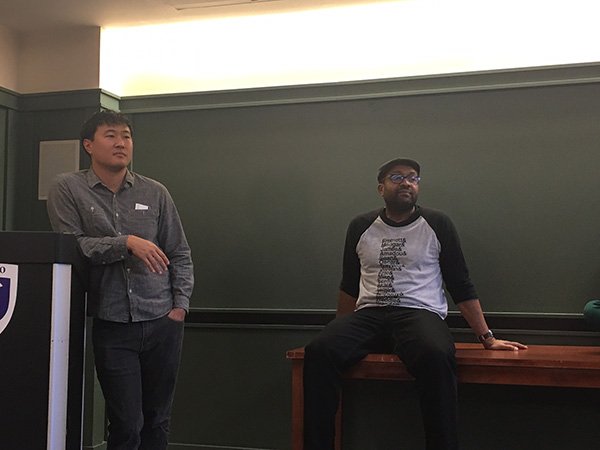Emerson Faculty, Alumnus Give Insights into Writing

Emerson College faculty member Jabari Asim and alumnus Matthew Salesses, MFA ’10, read from their current work and talked about point of view, social media, and emotional distance when writing during a reading and Q&A on March 17.
The Little Building’s Beard Room was filled to capacity, with students and faculty standing in the back, sitting in the aisles, and perching on tables at the event, which was sponsored by the Department of Writing, Literature and Publishing.
Salesses, author of novels including The Hundred-Year Flood, essays, and a novella, read a chapter from The Murder of the Doppelganger, a novel he expects to come out in 2018. It’s the story of a man who is visited by a woman who looks exactly like his girlfriend, bearing a photo of a man who looks exactly like himself. But the man in the picture has been murdered, and the narrator tries to learn who killed his alternate self.
Associate Professor Asim, executive editor of The Crisis, the NAACP’s journal of politics, ideas, and culture, has published nonfiction, fiction, and children’s literature, and is a multidisciplinary artist. He read a series of poems from a manuscript in progress, as well as one from a forthcoming collection. The poems, all based on actual events and statistics, tell stories of being black in America.
When asked how he draws inspiration from his surroundings, Salesses relayed a story about living in Watertown, Massachusetts, during the manhunt for the Boston Marathon bombers in 2013. At the time, he and his family were living a mile from the shootout, and for weeks afterward, his then-year-old daughter would make siren noises all the time.
“We realized she had heard so many sirens that one night that it had become part of her vocabulary, and I guess that’s how I think of it,” Salesses said. “A place has left some kind of imprint on you, and it leaks into your language without you realizing it’s happening.”
Both Salesses, who is Korean American, and Asim, who is African American, told an audience member that they don’t feel obligated to represent a particular viewpoint when writing for mainstream audiences, but that doesn’t mean mainstream culture doesn’t impact their work.
“I’m not thinking too much about what mainstream culture may think about what I’m writing,” Asim said. “Of course, the reality of publishing is…editors who look like me, I can count them on one hand, basically.
“I think I do suffer as a writer, but not so much that I would stop writing,” Asim added.
Both authors were asked how they know which genre of writing an idea will become. Asim said he lets the material “speak” to him, and he rarely disobeys his initial impulse. Salesses said the division between fiction and nonfiction is clear, but he often needs to decide how much time and effort to give a piece.
“What I’m usually thinking about is, ‘Is this a tweet or a series of tweets, or an essay?’” he said.
Both writers said they find social media to be a useful tool, in terms of finding a community and hearing about and sharing news and information that doesn’t get disseminated by mainstream media.
Salesses and Asim were asked how they maintain an emotional distance from their work when so much of it is psychically and spiritually difficult and painful.
They don’t, nor do they particularly recommend it.
Asim said he spent seven years researching his book The N Word: Who Can Say It, Who Shouldn’t, and Why, and “it was horrible every day.”
“I don’t really have a distance, is the short answer,” he said. “I tend to live the experience a little bit, and it helps me make the language vivid or not so vivid.”
Salesses said emotion can give you invaluable information about a situation or character.
“Holding onto those emotions and looking at them carefully can tell you a lot about the character’s beliefs, and also your own beliefs,” he said.
Categories